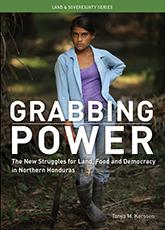Palm Oil and Extreme Violence in Honduras: The Inexorable Rise and Dubious Reform of Grupo Dinant
 As one of the fastest growing global commodities, palm oil has recently earned a reputation as a major contributor to tropical deforestation and, therefore, to climate change as well.
As one of the fastest growing global commodities, palm oil has recently earned a reputation as a major contributor to tropical deforestation and, therefore, to climate change as well.
About 50 million metric tons of palm oil is produced per year – more than double the amount produced a decade ago – and this growth appears likely to continue for the foreseeable future. Because oil palm trees, native to West Africa, require the same conditions as tropical rainforests, nearly every drop of palm oil that hits the global market comes at the expense of natural forests that have been, or will be, burned, bulldozed and replaced with plantations.
With deforestation garnering headlines due to forests’ crucial role in regulating the climate, global commodity producers, from Nestle and Unilever in Europe, to Cargill in the United States to Wilmar International in Indonesia, are recognizing the need to provide products that are “deforestation-free.” Other corporate-led initiatives like the public-private Tropical Forest Alliance that promises to reduce the deforestation associated with palm oil, soy, beef, paper and pulp, and the recent New York Declaration on Forests signed at the UN Climate Summit in New York, suggest that saving the world’s forests is now squarely on the corporate sustainability agenda.
But what is being left behind is the other significant impact of palm oil and other agro-industrial commodities – namely human rights. Commitments to protect forests and conservation areas can, if well implemented, address environmental concerns by delimiting the areas of land available for conversion to palm oil. But natural resource exploitation is inextricably linked to human exploitation, and such commitments do little to address this.
A case in point is Grupo Dinant, a Honduran palm oil company that declared last month that it has been awarded international environmental certifications for its achievements in environmental management and occupational health and safety. Dinant has also been making overtures toward joining the Roundtable on Sustainable Palm Oil (RSPO), including hosting the RSPO’s 4th Latin American conference in Honduras in 2013. But, Dinant, which produces about 60 percent of the palm oil in Honduras, is at the center of what has been called “the most serious situation in terms of violence against peasants in Central America in the last 15 years.”
Owned by Miguel Facussé, one of the wealthiest men in Honduras, Dinant has been associated with the killings of over 100 peasant farmers, and appears to be involved in a virtual terror campaign to ensure control of a large swath of land in the Lower Aguan Valley near the Caribbean coast of Honduras. While credible human rights groups like Human Rights Watch denounce the killings and note that “virtually none of the crimes are properly investigated, let alone solved,” Dinant continues to enjoy financing from the World Bank’s International Finance Corporation, support from the United Nations Clean Development Mechanism, and brand relationships with multinational consumer goods companies such as Mazola Oils.
The Aguán Valley and the Introduction of Palm Oil
Stay in the loop with Food First!
Get our independent analysis, research, and other publications you care about to your inbox for free!
Sign up today!The Bajo Aguán Valley, one of the most fertile regions in Honduras, has long been a center of agrarian conflict. In her book Grabbing Power: The New Struggles for Land, Food and Democracy in Northern Honduras, Food First researcher Tanya Kerssen reaches back to the 1950s to show how a struggle between farmers’ associations and multinationals Standard Fruit and United Fruit Company set the scene for the land concentration that reigns today. Decades of peasant struggle led to a brief period in the 1970s when the government distributed land to smallholder farmers from other parts of the country, who then formed cooperatives to bring crops to market. The embattled region became briefly known as the “capital of land reform” – but these reforms have long since been rolled back, in part due to the country’s need to pay back its foreign debt.

 Help Food First to continue growing an informed, transformative, and flourishing food movement.
Help Food First to continue growing an informed, transformative, and flourishing food movement.




